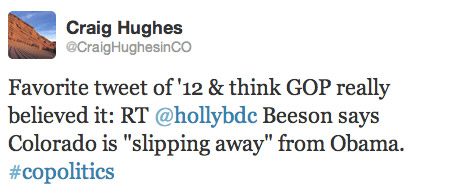Postcards From The Edge
The Hill, noted for the record last week:
Nearly half of Republican voters say that ACORN – the community organizing group that closed in 2010 – aided in stealing the 2012 election for President Obama, according to a new poll released Tuesday.
The survey, conducted by Democratic polling firm Public Policy Polling, found that 49 percent of GOP voters believe that the president did not legitimately win reelection because ACORN interfered with the vote. A full 50 percent of Republicans said Democrats engaged in some sort of voter fraud.
More from Public Policy Polling’s election aftermath polling memo:
Some GOP voters are so unhappy with the outcome that they no longer care to be a part of the United States. 25% of Republicans say they would like their state to secede from the union compared to 56% who want to stay and 19% who aren’t sure.
One reason that such a high percentage of Republicans are holding what could be seen as extreme views is that their numbers are declining. Our final poll before the election, which hit the final outcome almost on the head, found 39% of voters identifying themselves as Democrats and 37% as Republicans. Since the election we’ve seen a 5 point increase in Democratic identification to 44%, and a 5 point decrease in Republican identification to 32%. [Pols emphasis]

“Swastika Guy,” circa February 2009.
Almost from the moment President Barack Obama took office, the opposition to his agenda took on an extreme, overheated sense of urgency on the right. Political rhetoric on the right evoked a sense of desperation trending toward outright rebellion–generally based on false, and often hysterical, predictions of what Obama’s agenda would mean for the country.
 This irrational radicalization of the grassroots right wing reached its peak during the passage of health care reform legislation and the 2010 election cycle. The fact is, “Obamacare” as finally passed by Congress and signed into law is a far cry from true left-wing aspirations for health care reform, and has more in common with conservative proposals for reforming health care from the Heritage Foundation (or Mitt Romney) than anything one can legitimately call “socialized medicine.” This resulted in a situation where liberal base Democrats were nonplussed by Obama for “giving away too much,” while the right wing painted Obama as a “communist” unfettered by objective facts about his very much centrist actual policies.
This irrational radicalization of the grassroots right wing reached its peak during the passage of health care reform legislation and the 2010 election cycle. The fact is, “Obamacare” as finally passed by Congress and signed into law is a far cry from true left-wing aspirations for health care reform, and has more in common with conservative proposals for reforming health care from the Heritage Foundation (or Mitt Romney) than anything one can legitimately call “socialized medicine.” This resulted in a situation where liberal base Democrats were nonplussed by Obama for “giving away too much,” while the right wing painted Obama as a “communist” unfettered by objective facts about his very much centrist actual policies.
Today, their failure is evident everywhere. The intense four-year campaign to irrationally vilify Obama is bankrupt. Only a declining number of hardcores (see poll) are not aware of this.
But those hardcores aren’t going away. Indeed, they think they define “true conservatism.”
We’re not saying this one poll is gospel, but a drop in Republican self-identification, if it’s corroborated and if it continues, could portend an historic re-alignment–real upheaval in the party, or perhaps even a new party to represent the half of America with ideologically conservative predispositions. Among many Democrats at least, there’s a sense that the GOP is permanently marginalizing itself, hastening an irrelevance for political conservatism that many even on the left would say doesn’t fairly represent the views of our ideologically divided nation.
If that’s what must happen, the question is, how many elections will it take? The answer is almost certainly more than the one we just finished. It’s not going to be pretty. The traditional Republican core of wealthy business interests has always required a coalition with other popular movements to survive, but they chose poorly in subsidizing the “Tea Party”–the latest iteration of the John Birch radical right they used to be much better about keeping at arm’s length.
Like we said last week, Republican elites who would like nothing more than to euthanize the “Tea Party” now that it is no longer useful can’t do so–because as this poll indicates, the irrational grassroots they whipped into a froth in 2010 have a life of their own. This is their base now.
And if it is pushing the GOP out of the American mainstream, nobody is stopping it yet.


